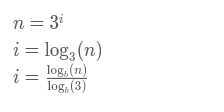Given an integer, write a function to determine if it is a power of three.
判断一个整数是否是3 的幂。
思路:
1. 判断是否为3的倍数
2. 在3的倍数中,判断是否为3的幂
3. 循环中,只要有余数就不是3的幂,并且跳出循环
4. 剩下的数就是3的幂
class Solution: def isPowerOfThree(self, n: int) -> bool: out = None if n == 1: out = True elif n%3 != 0: out = False else: while n > 1: y = n%3 if y != 0: out = False break n = n/3 out = True return out

def isPowerOfThree(n): if n < 1: return False while n%3 == 0: n /= 3 return n == 1 #判断n是否为1,若n不是1,则n不是3的幂
#check n!= 0
#不考虑负数
时间复杂度:O(log3(n)) 不断地除以3
空间复杂度:O(1)
思路相同,但答案的代码简洁明了,望尘莫及T_T
Approach 2: Base Conversion(进制转换)
在10进制中,10,100,1000为10的幂
在2进制中,10,100,100为2的幂
在3进制中,

102 = 1*3^2+0*3^1+2*3^0
因此,在该式子中,当只有其中一个系数为1、 其它系数都为0时,这个3进制表示的数一定为3的幂。
所以需要:1.进制转换 2.判断1和0的情况(正则)
class Solution: def isPowerOfThree(self, n: int) -> bool: import re def dec_to_tri(num): l = [] while True: num, reminder = divmod(num, 3) l.append(str(reminder)) if num == 0: return "".join(l[::-1]) if n < 0: return False else: return(re.match("^10*$",dec_to_tri(n)))
时间复杂度:O(log3(n))
进制转换的原理是不断地除以3,所以复杂度为O(log3(n))
正则匹配的复杂度O(log3(n))
空间复杂度:O(log3(n))
比方法一多用了两个变量:
3进制表示的n(size O(log3(n)))
正则匹配的字符串 size constant

当且仅当i为整数时,n为3的幂
class Solution: def isPowerOfThree(self, n: int) -> bool: if n < 1: return False else: return math.log10(n)/math.log10(3)%1 == 0
#时间复杂度:未知,math.log操作限制了我们算法的时间复杂度,具体取决于我们使用的语言和编译器
#空间复杂度:O(1) 未使用其它变量
因为int范围内最大3的幂次方是3^19次方1162261467 只要判断能能否被这个数整除即可:
class Solution: def isPowerOfThree(self, n: int) -> bool: if n < 1: return False else: return 1162261467 % n == 0
#时间复杂度:O(1) 只有判断和除法
#空间复杂度:O(1)

在Java中的运行情况,数字代表运行的时间,单位:秒。
当N数值较小时,4种方法的表现差异不大。随着N数值增大,我们能发现方法四是性能最好的一种方法。
Simple optimizations like this might seem negligible, but historically, when computation power was an issue, it allowed certain computer programs (such as Quake 3 [4]) possible.
当处理的数据规模较小时,似乎没有必要研究如此多的方法。
当处理的数据规模增大时,有些方法的优势就显现出来了,特别计算力不够、数据又十分庞大的情况下。
所以,我还是想不到后面两种方法。。。太优(BIAN)秀(TAI)了
Ref: https://leetcode.com/explore/featured/card/top-interview-questions-easy/102/math/745/
【LeetCode】【 Math】 判断一个数字是不是3的幂
原文:https://www.cnblogs.com/jialinliu/p/12733417.html